This Calculator is for Adults only 20+ Years, to check your Child’s or teen BMI you can use our other Calculator:
https://bmicalculator.help/body-mass-index-calculator-tool-for-teens-and-children/
BMI Calculator
Use this calculator to check your body mass index (BMI).

Unit type
Height
cm.
Please enter value between 125 and 225.
Weight
kg.
Please enter value between 10.0 and 500.0 ( one decimal ).
Height
ft.
in.
Please enter value between 4.2 and 7.3
Weight
lb.
st.
Please enter value between 22.0 and 1000.0 ( one decimal ).
Calculate BMI 

Use this calculator to check your body mass index (BMI), which can be a helpful tool in determining your weight category. Or, use it to calculate your child’s BMI.
Your Body Mass Index (BMI) is
Based on your input, your BMI is in the category
You
Underweight
Healthy
Overweight
Obese
For your height, a healthy weight would be between kilograms
For your height, a healthy weight would be between lb.
How to Use Our BMI Calculator Tool:
Metric option:
- Enter your height in meters (m) and centimeters (cm) e.g 144(cm)
- Enter your weight in kilograms (kg) e.g 60(kg)
Imperial option:
- Enter your height in feet (ft) and inches (in) e.g 5 (ft) 8 (in)
- Enter your weight in pounds (lb) and stones (st) e.g 170 (lb) 12 (st)
Note:
1 stone (st) is equal to 14 pounds (lb)1
foot (ft) is equal to 12 inches (in)
What is BMI?
Boddy Mass Index (BMI) is a widely used measurement to assess body fat based on height and weight.
BMI Formula:
The BMI formula is simple, it’s weight in kilograms (kg) divided by the square of height in meters (m2). The resulting value is then categorized into different weight ranges.
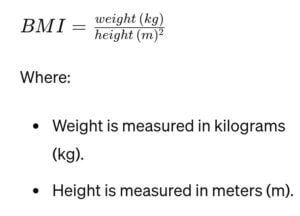
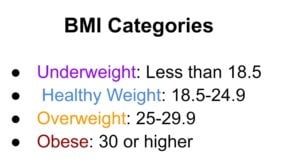
BMI Chart for Teens, Men,Women and and Older Adults :
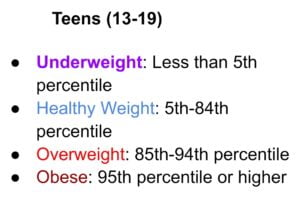
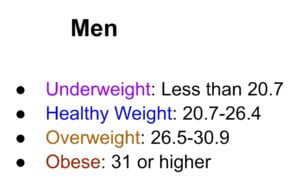
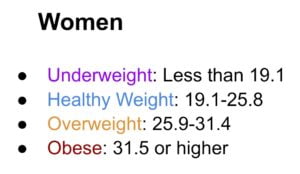
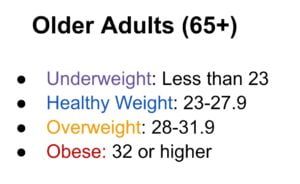
Health issues related to BMI:
Maintaining a healthy BMI is very important because it can lead you to various health issues, such as:
Chronic Diseases
- Diabetes: Being overweight can increase the risk of developing type 2 diabetes
- Hypertension: Individuals with a high BMI usually have High blood pressure
- Heart Disease: Excess weight can increase the risk of heart disease and stroke
- Cancer: Individuals with a high BMI have certain types of cancer (breast, colon, kidney).
Mental Health
- Depression: Low self-esteem and body weight dissatisfaction can lead to depression.
- Anxiety: The force to maintain or achieve a certain weight can lead an individual to anxiety.
Sleep Disorders
- Sleep Apnea: Pauses in breathing during sleep.
- Insomnia: Difficulty in falling or staying asleep.
Joint Problems
- Osteoarthritis: Wear and tear on joints.
- Mobility Issues: Reduced mobility and flexibility.
Disadvantages of Being Overweight:
- Increased risk of chronic diseases.
- Reduced life expectancy.
- Mobility issues and reduced flexibility.
- Low self-esteem and body dissatisfaction.
- Social isolation and reduced participation in activities.
Disadvantages of Being Underweight:
- Weakened immune system.
- Fatigue and low energy.
- Poor wound healing.
- Hair loss.
- Increased risk of osteoporosis.
Limitations of BMI:
- Fails to distinguish between muscle and fat.
- Ignores body composition and waist circumference.
- May not be suitable for older adults or individuals with a muscular build.
Conclusion:
BMI is a useful starting point for assessing body fat and health risks, but it’s essential to consider its limitations and combine it with other measures for a comprehensive understanding of your health. By maintaining a healthy BMI and addressing related health issues, you can reduce your risk of chronic diseases and improve your overall well-being.